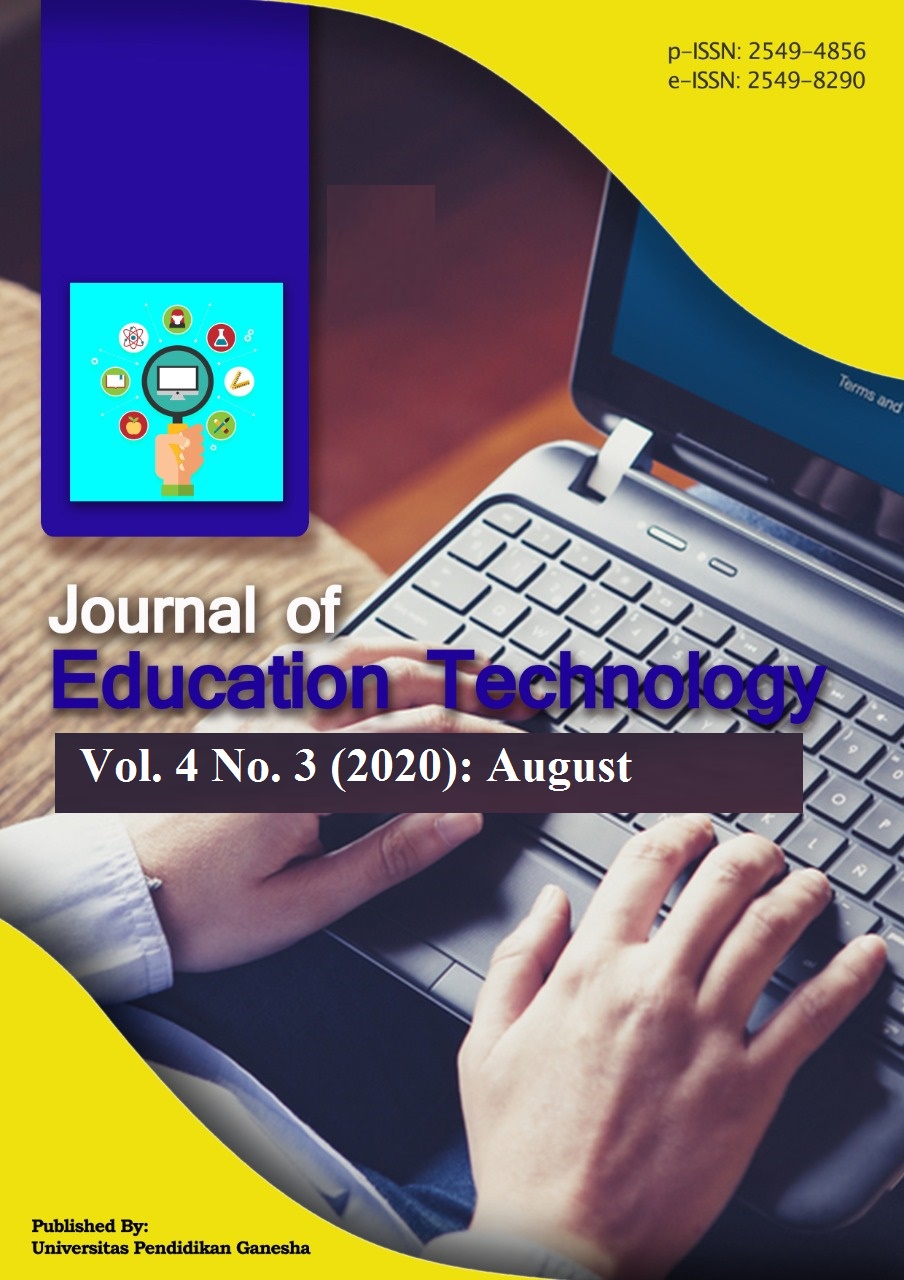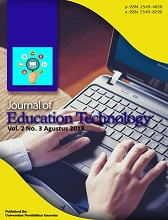Team Assisted Individualization Model Assisted by Effective Ludo Media Improving Student Learning Outcomes
DOI:
https://doi.org/10.23887/jet.v4i3.27794Kata Kunci:
Learning outcomes, Problem solving skills, team assisted individualization, ludoAbstrak
The low competence of mathematical knowledge caused by the lack optimal use of the learning model makes it difficult for students to understand the learning material. The purpose of this study was to analyze the effectiveness of the Team Assisted Individualization model assisted by Ludo media on learning outcomes in terms of the problem-solving ability of fraction material. This type of research was a quantitative study using pre-experimental design in the form of a one-group pretest-posttest design. The number of samples in this study was all students of class IV, amounting to 26 students using saturated sampling type sampling. Data collection in this study was obtained through interviews, tests and documentation. The results of data analysis obtained tcount 9.698 and ttable 1.706 with a significant level of 5%. Because t_count> ttable is 9.698> 1.706, so H_0 is rejected, which means that there are differences in pretest and posttest learning outcomes. Then the two-party t-test of problem-solving abilities shows that tcount> ttable is 8,000> 1,671 then H_0 is rejected, so there is a significant difference in learning outcomes seen from the problem-solving ability using the Team Assisted Individualization model with groups that are taught with conventional models in grade IV SD. The Team Assisted Individualization model assisted by Ludo media is effectively applied in the learning process to improve student learning outcomes for fractions.
Referensi
Anika, & Fajar. (2020). Efektivitas Model Pembelajaran Kooperatif Tipe Make-A Match Dalam Meningkatkan Kompetensi Sikap Siswa dan Kompetensi Pengetahuan Siswa Pada Pelajaran IPS. Jurnal Ilmiah Sekolah Dasar, 4(1), 80–85.
Ariawan, & Pratiwi. (2017). Eksplorasi Kemampuan Siswa Kelas Iv Sekolah Dasar Dalam Penyelesaian Soal Cerita Matematika. Jurnal Pendidikan Indonesia, 6(1), 82–95. Retrieved from https://ejournal.undiksha.ac.id/index.php/JPI/article/view/9184/6327. 82-95
Donas Ahmad Najib &Elhefni. (2016). Pengaruh Penerapan Pembelajaran Bermakna (Meaningfull Learning) Pada Pembelajaran Tematik IPS Terpadu Terhadap Hasil Belajar Siswa Kelas III di MI Ahliyah IV Palembang. JIP: Jurnal Ilmiah PGMI, 2(1), 19–28.
Donas, & Elhefni. (2016). Pengaruh Penerapan Pembelajaran Bermakna (Meaningfull Learning) Pada Pembelajaran Tematik IPS Terpadu Terhadap Hasil Belajar Siswa Kelas III di MI Ahliyah IV Palembang. JIP: Jurnal Ilmiah PGMI, 2(1), 19–28.
Farnika, Ikhsan, & Sofyan. (2015). Peningkatan Kemampuan Pemahaman Dan Pemecahan Masalah Matematis Sekolah Menengah Atas Dengan Model Pembelajaran Kooperatif Tipe Team Assisted Individualization. Jurnal Elemen Program Studi Matematika, 1(2), 144–152. Retrieved from http://ejournal.hamzanwadi.ac.id/index.php/jel/article/view/146
Hapsari, & Suminar, R. (2014). Efektifitas Ludo Words Game (LWG) terhadap Peningkatan Kosakata Bahasa Inggris pada Anak Studi Kasus Pada Siswa Kelas IV SD Muhammadiyah 4 Pucang. Jurnal Fakultas Psikologi Universitas Airlangga. Retrieved from http://journal.unair.ac.id/download-fullpapers-01 Iriani Indri Hapsari, Efektifitas Ludo Words Game.pdf
Irwandi. (2020). Penggunaan Media Audio Visual Dalam Peningkatan Hasil Belajar Materi Rukun Iman Pada Siswa Kelas I SD Negeri 49 Kota Banda Aceh. Pionir Jurnal Pendidikan, 9(1), 25–44.
Ismayani, Ani, & Nuryanti. (2016). Penerapan Project Based Learning dalam Pembelajaran Matematika untuk Meningkatkan Kemampuan Komunikasi Matematis dan Aktivitas Belajar Siswa. Prosiding.
Jihan, Reffiane, & Arisyanto. (2019). Pengembangan Media Ludo Raksasa Pada Tema Selalu Berhemat Energi Untuk Meningkatkan Motivasi Belajar Siswa Kelas IV Sekolah Dasar. Mimbar PGSD Undiksha, 7(2), 107–113.
Kartika, & Dkk. (2017). Pengaruh Model Pembelajaran PBL Berbantuan Media Gambar Terhadap Hasil Belajar IPA Pada Siswa Kelas V. E-Journal PGSD Universitas Pendidikan Ganesha, 5(2), 1–11.
Lestari, K. E. (2015). Penelitian Pendidikan Matematika. Bandung: PT Refika Aditama.
Mahendra, E. (2017). Project Based Learning Bermuatan Etnomatematika Dalam Pembelajar Matematika. Jurnal Pendidikan Indonesia, 6(1). Retrieved from https://ejournal.undiksha.ac.id/index.php/JPI/article/view/9257/6329
Marliani. (2015). Peningkatan Kemampuan Berpikir Kreatif Matematis Siswa melalui Model Pembelajaran Missouri Mathematics Project (MMP). Jurnal Ilmiah Pendidikan MIPA, 5(1), 14–25. https://doi.org/https://doi.org/10.30998/formatif.v5i1.166
Mufida, & Wiyatmo. (2018). Pengembangan Media Pembelajaran Permainan Ludo Untuk Meningkatkan Penguasaan Materi Dan Minat Belajar Fisika Peserta Didik SMA. Jurnal Pendidikan Fisika UNY.
Nisa, & Wiryanto. (2019). Pengaruh Penggunaan Media Ludo Terhadap Hasil Belajar Matematika Materi Bangun Ruang Siswa Kelas V SD. Jurnal Penelitian Pendidikan Guru Sekolah Dasar, 7(3), 2909–2919. Retrieved from https://jurnalmahasiswa.unesa.ac.id/index.php/jurnal-penelitian-pgsd/article/view/28029/25644
Nurfitriana. (2015). Pengembangan Permainan Monopoli Berbasis CAI Sebagai Media Pembelajaran Pada kompetensi Dasar Menganalisis Jabatan. Jurnal Pendidikan Administrasi Perkantoran, 7(4), 51–58.
Pratiwi, I. A., Ardianti, S. D., & Kanzunnudin, M. (2018). Peningkatan Kemampuan Kerjasama Melalui Model Project Based Learning (Pjbl) Berbantuan Metode Edutainment Pada Mata Pelajaran Ilmu Pengetahuan Sosial. Refleksi Edukatika : Jurnal Ilmiah Kependidikan, 8(2). https://doi.org/10.24176/re.v8i2.2357
Puspita, N. M., Asri, I. A. S., & Ardana, I. K. (2019). Pengaruh Model Pembelajaran Kooperatif Tipe Scramble Berbantuan Media Video Animasi Terhadap Kompetensi Pengetahuan PPKn. Media Komunikasi FPIPS, 17(2), 1–10. https://doi.org/10.23887/mkfis.v17i2.22221
Qondias, & Dkk. (2016). Pengembangan Media Pembelajaran Tematik Berbasis Mind Mapping SD Kabupaten Ngada Flores. Jurnal Pendidikan Indonesia, 5(2), 176--182. Retrieved from https://ejournal.undiksha.ac.id/index.php/JPI/about
Renny, Sonbay, Yohana, R. (2019). the Effect of Open-Ended Teaching Model on Mathematics. 1(2), 105–110.
Shoimin. (2014). Model Pembelajaran Inovatif Dalam Kurikulum 2013. Yogyakarta: Ar-Ruzz Media.
Siwi, Sudrajat, & Wardana. (2019). Keefektifan Model Team Assisted Individualization Berbantu Media Corong Hitung Terhadap Hasil Belajar Matematika. Mimbar PGSD Undiksha, 7(2), 128–134. Retrieved from https://ejournal.undiksha.ac.id./index.php/JJPGSD/article/view/17557/10535
Slameto. (2010). Belajar dan Faktor-Faktor Yang Mempengaruhinya. Jakarta: Rineka Cipta.
Sobron, A. ., Bayu, Rani, & Meidawati. (2019). Persepsi Siswa Dalam Studi Pengaruh Daring Learning Terhadap Minat Belajar IPA. SCAFFOLDING: Jurnal Pendidikan Islam Dan Multikulturalisme, 1(2), 30–38.
Suarsana, Supawidhiasih, & Parwati. (2018). The Use Of Portfolio Assessment To Overcome The Weakness Of Scientific Approach. Jurnal Pendidikan Indonesia, 7(1). https://doi.org/10.23887/jpi-undiksha.v7i1.10394
Sudharto, D. (2013). Pengantar Ilmu Pendidikan (IKIP PGRI SEMARANG, ed.). Semarang.
Sundayana, & Rostina. (2014). Media Dan Alat Peraga Dalam Pembelajaran Matematika. Bandung: Alfabeta.
Susanto, A. (2016). Teori Belajar & Pembelajaran di Sekolah Dasar. Jakarta: Prenadamedia Group.
Trisnawati, T. (2019). Journal Of Matematics Learning. 37–45.
Weni, Susanti, & Jatmiko. (2016). Implementasi Model Pembelajaran Kooperatif Tipe Tai (Team Assisted Individualization) Untuk Meningkatkan Hasil Belajar Fisika Siswa Sma Pada Materi Elastisitas. Jurnal Penelitian Fisika Dan Aplikasinya (JPFA), 6(1), 26–33. Retrieved from https://journal.unesa.ac.id/index.php/jpfa/article/view/882/671 06,01 2016
Widiana, & Dkk. (2018). The Effectiveness of Tradional Game-Based Communication Learning Activity For Cognitive Process Dimension Learning Achievement. Cakrawala Pendidikan, 1(2), 260–269.
Wulandari, & Dkk. (2020). Pengembangan Pembelajaran Blended Pada Mata Kuliah Ahara Yoga Semester II di IHDN Denpasar. Jurnal Edutech Undiksha, 8(1), 1–15. Retrieved from https://ejournal.undiksha.ac.id/index.php/JEU/article/view/26459/15780
Wungguli, D., & Yahya, L. (2020). Pengaruh Penggunaan Media Berbasis Information and Communication Technology (ICT) terhadap Hasil Belajar Siswa pada Materi Dimensi Tiga. Jambura Journal of Mathematics Education, 1(1), 41–47. https://doi.org/10.34312/jmathedu.v1i1.5376
Yusuf, M. (2015). Asessmen dan Evaluasi Pendidikan. Jakarta: Prenadamedia Group.
Unduhan
Diterbitkan
Cara Mengutip
Terbitan
Bagian
Lisensi
Authors who publish with the Journal of Education Technology agree to the following terms:
- Authors retain copyright and grant the journal the right of first publication with the work simultaneously licensed under a Creative Commons Attribution License (CC BY-SA 4.0) that allows others to share the work with an acknowledgment of the work's authorship and initial publication in this journal.
- Authors are able to enter into separate, additional contractual arrangements for the non-exclusive distribution of the journal's published version of the work (e.g., post it to an institutional repository or publish it in a book), with an acknowledgment of its initial publication in this journal.
- Authors are permitted and encouraged to post their work online (e.g., in institutional repositories or on their website) prior to and during the submission process, as it can lead to productive exchanges, as well as earlier and greater citation of published work. (See The Effect of Open Access)


















